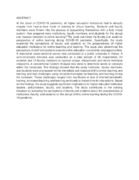| dc.description.abstract | At the onset of COVID-19 pandemic, all higher education institutions had to abruptly migrate from face-to-face mode of learning to virtual learning. Students and faculty members were thrown into the process of acquainting themselves with a fully virtual system. How prepared were institutions, faculty members, and students for the abrupt and massive transition to online learning? The study examined the faculty and students’ perspective of online learning during COVID-19 pandemic. Specifically, the study examined the perceptions of faculty and students on the preparedness of higher education institutions for online teaching and learning. The study also determined the perceptions of staff and students towards online education, constraints, and opportunities. A descriptive cross-sectional survey was conducted at a public university in Kenya. A semi-structured interview was conducted on a total sample of 36 respondents; 24 students and 12 faculty members to capture unique, idiosyncratic and whole individual viewpoints. A conventional Content Analysis was done to determine words or concepts within the transcripts. The findings showed that the study institution, faculty members, and students were unprepared for the immediate and massive shift to online teaching and learning and had challenges using virtual technologies for teaching and learning during the lockdown. These challenges ranged from insufficient or lack of internet bandwidth, training, increased teaching and learning workloads to limited time for interactions. Based on the findings, the study suggests significant implications for higher education institution leaders, policymakers, faculty, and students. The study contributes to the existing literature by analyzing the perceptions of faculty and students about the preparedness of institutions, faculty, and students on the abrupt shift to online learning during the COVID-19 pandemic. | en_US |
